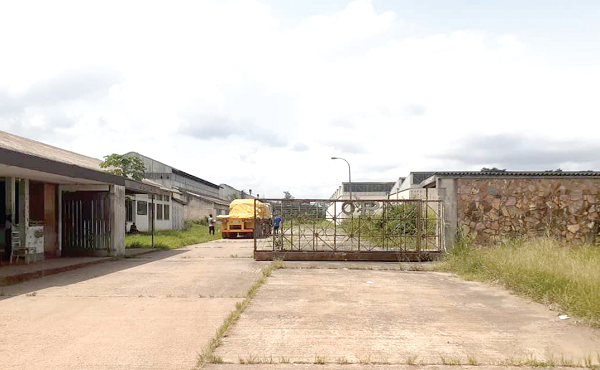
Western Region’s Bonsa Tyre Factory defunct
In the Tarkwa Nsuaem Municipality is a giant sleeping industry, Bonsa Tyre Company Limited (BTCL), once vibrant but sadly non-functional for a number of decades.
With well-known brands of rubber products, from various sizes of tyres to tubes, the factory, in the 1990s saw heavy investment for refurbishment to bring it back to life, but that did not work and new equipment have been left to rot.
The tyre factory has now been taken over by weeds and has become a den of reptiles.
Firestone’s withdrawal
The BTCL, which was established in 1963 as part of the import substitution programme, was to produce vehicle tyres for the local automobile assembling industry and the mines.
However, from the records, ever since Firestone Tyres, a global brand, withdrew from the joint venture agreement and sold its 60 per cent shares back to the government in 1980 due to operational difficulties, the plant has remained defunct.
However, the Ghana Export Promotion Authority (GEPA) — acting in capacity as the implementers of the new National Export Development Strategy (NEDS) programme — plans to revive the factory which has a rated production capacity of 1,500 tyres per day or about 420,000 tyres per annum.

Machinery in the factory left to decay
AfDB attempt, linkages
GEPA is said to be seeking a strategic investor as a previous attempt to do so with the African Development Bank in the early 1990s collapsed at the implementation stage due to several challenges.
Currently, the Ghana Rubber Estates Limited (GREL), one of the surviving factories, exports about 95 per cent of the rubber produced. Production increased from 18,000 tonnes in 2012 to over 40,000 tonnes in 2017, which suggests that GREL could be the best source of raw material for BTCL if revamped.
Recently, the Ghana Chamber of Mines called for a linkage to be developed between agriculture and other sectors in the country.
That linkage is to ensure in-country production of rubber, which the mines really need; and a revamped BTCL could have another market aside from vehicle tyres.
Cocoa processing
One other giant industrial sector in the region struggling to return to its glorious days is cocoa processing. Currently known as the West African Mills Company (WAMCO) and formerly known as West African Mills (WAM), the cocoa-processing factory, as well as some private enterprises are still challenged in so many ways.
WAMCO, which is the oldest cocoa-processing factory in the country, was established in 1947 by Gill and Dufus of London, Great Britain and began full production in 1949.
On behalf of the Government of Ghana through the Ghana Cocoa Board (COCOBOD), the government acquired 51 per cent in the company in 1963 and in 1982, Gill and Dufus handed over its share to the government.

WAMCO is currently struggling to stay in business
Production
In 1987, the government signed a loan agreement with a German company, Messrs Walter Schroeder/Hosta, for the re-equipment of the company in order to increase its capacity to 20,000 tonnes per annum, with Ghana holding 40 per cent interest and the investor holding 60 per cent, and the factory was renamed West Africa Mills Company.
Even though the factory is working partially, it is producing way below its capacity as it is faced with many challenges from finance to many others leading to the retrenchment of its workers, which has led to several agitations.
In its heyday, the bulk of the WAMCO products was exported mostly to European countries and the United States with a small percentage to Japan and some kibbled cakes marketed locally.
Workers
The sad tales of the factories in the Western Region have made many who moved to the region in search of jobs lose hope in the once vibrant region with endless opportunities.
Many of the employees laid off have on many occasions retired with nothing, while many others have passed on.
If the one-district, one-factory programme successfully rejuvenates these factories, then the region will have another story to tell — perhaps better than before and that will be a huge step towards a Ghana without aid.
